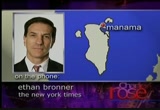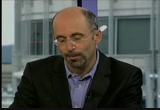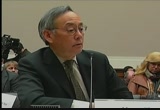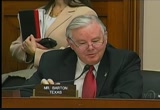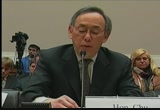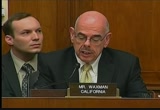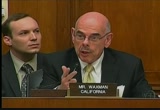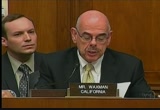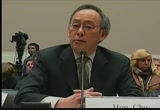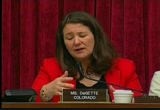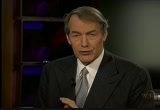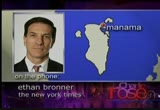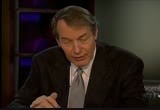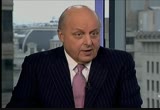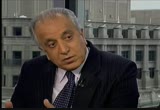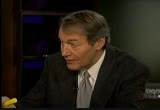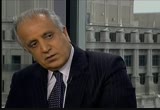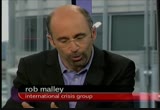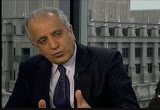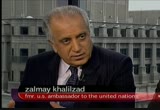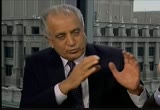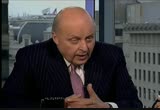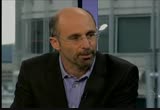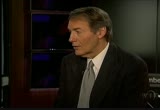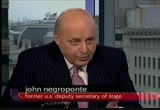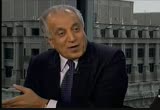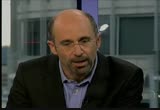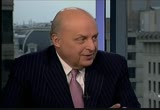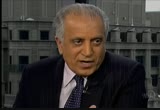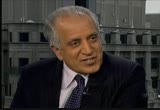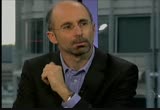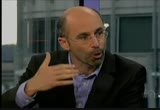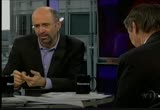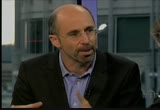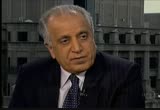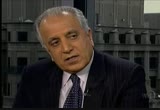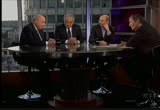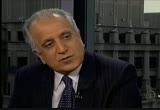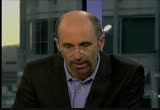tv Charlie Rose WHUT March 17, 2011 6:00am-7:00am EDT
6:00 am
>> rose: welcome to our program. tonight we begin with secretary of energy chu testifying on capitol hill about nuclear safety. >> the american people should have full confidence that the united states has a rigorous safety regulations in place to ensure that our nuclear power is generated safely and responsibly. information is still coming in about the events unfolding in japan, but the administration is committed to learning from japan's experience as we work to continue to strengthen america's nuclear industry. >> rose: and then by telephone, ethan brawner of the "new york times" in bahrain. >> it's hard to imagine how they can get back out in the streets quickly.
6:01 am
the tanks and the jeeps are out this very important places in great strength. again, on the other hand, bahrain really relies on the financial district and so on to have a normal life, and i think that they're going to have to end the curfew and the marshal law quality at some point. >> rose: we conclude this evening with a look at the continuing crisis in the middle east and north africa with rob malley, john negroponte, and zalmay khalilzad. >> i think what mrs. : clts has done, secretary clinton, has been to hold back on the idea of us stepping forward unilaterally on this but saying, look, if we get the requisite support from the international community, including the arab league, then the predicate has been set for some kind of roll by us in this situation. it has been slow. i agree with rob. and probably what it does is, it slows the attainment of our objectives, and it maybe makes a
6:02 am
sort of stalemated situation the best that can be achieved in the short term. but i think something has to be done to stop the rapid erosion of the opposition's position, and that's got to be done sooner than later. >> rose: the tragedy in japan, nuclear safety, and the middle east when we continue. if you've had a coke in the last 20 years, ( screams ) you've had a hand in giving college scholarships... and support to thousands of our nation's... most promising students. ♪ ( coca-cola 5-note mnemonic ) every story needs a hero we can all root for. who beats the odds and comes out on top.
6:03 am
but this isn't just a hollywood storyline. it's happening every day, all across america. every time a storefront opens. or the midnight oil is burned. or when someone chases a dream, not just a dollar. they are small business owners. so if you wanna root for a real hero, support small business. shop small. captioning sponsored by rose communications this is charlie rose. >> rose: the tragedy in japan continues with many questions. there are also questions here in
6:04 am
the united states about the safety of nuclear power around the world. in the united states, secretary of energy steven chu said at a congressional hearing today, the obama administration still supports expanding nuclear plants. >> in light of what's happened in japan, would like to hear what you believe president obama's position is on nuclear power generally in the united states. does he still support a rebirth of nuclear power and construction of new plants? could you just give us your best estimate of what his position is. >> i think the president and the administration believe that we have to be looking very, very closely at the events in japan. as we said before, we have to apply whatever lessons that can be and will be learned from what has happened and is happening in japan. with those lessons, would them be applied to first look at our current existing fleece of reactors to make sure they can be used safely. and also to look at how, as one
6:05 am
proceeds forward, that any lessons learned should be applied. it would be premature to say anything other than we will use this opportunity to learn as best we can and look carefully how to go forward. >> i'm not sure what you just said. >> okay. >> does the president support new nuclear power plant construction in the united states? >> the present budget is what it is. and we're asking for loon guarantees. the president's budget is also calling for small modular reactors. that position has not been changed. >> so that's a yes. >> that's a yes. >> good. that's what i wanted you to say. see, if you had just said yes twould have been easy. now, with regards to the loon guarantees that you just-- just mentioned, given again what's happened, do you and the
6:06 am
president want the congress to support the full $36 billion that you have put in the president's budget? >> yes. >> okay. you're learning. you're not a nobel prize winner for nothing, i guess, huh? >> rose: secretary chu also faced tough questions today about possibility of a similar accident in the united states. >> mr. secretary, after chernobyl, many said such an event could not happen in the united states because the soviet union's nuclear sector was not as advanced as our own. and there was truth to that. the chernobyl plant was not as advanced and was not designed with many of the safeguards we have in the united states. but japan is a highly developed country. it is as technologically sophisticated as us, and there's much concern in the u.s. that a similar accident can occur here. how do you respond to that concern? >> well, first, i would agree
6:07 am
with you. the reactor in chernobyl was of a different design. it was-- it had point of instability. it had no containment vessel. but we are looking very carefully at what is naepg japan because, as you say, they're using more advanced designs. a number of reactors in the united states have similar designs, and we're going to look at what went wrong in terms of the double-barreled whammy this huge, hung earthquake and huge su, and look to our reactors again and learn as much as we can so we can, if needed, improve the safety. by "if needed" what i really mean is we're always increasing the safety of our reactors, and not only our reactors but the safety of all our industrial systems. >> mr. secretary, two days ago a
6:08 am
number of us wrote to chairman upton, whitfield, and stearns, asking our committee here investigate and hold hearings about the safety and prepared understandness of the nuclear power plant in the united states. do you think we should having the issues to ensure the safety of our nuclear plant. >> i think that will naturally kespecially given the events in japan. we will look back, as we learn what happened, and apply those lessons . >> i think we have a responsibility in the congress, not just you in your position, but we in congress, since we write the laws. let me ask you about the laws that we're in the middle of writing. we're trying to figure out our energy policy, and the republican energy policy seems to be depending on coal, oil, and nuclear power.
6:09 am
that's what they look to for the future. in fact, it's been the past. and we do have a problem of climate change because of the carbon and other greenhouse gasses. we do have a problem now that all of our eggs are in the nuclear basket. when we look at the republican budget, they are putting in billions of dollars of investment and thousands of construction and permanent jobs are all going to nuclear. but they're rescinding a lot of your budget to deal with other things that are clean and reliable and safe, such as renewable energy and energy efficiency. just to dramatize this issue, the republicans on this-- republicans would rescind $25 billion of the 47 billion in
6:10 am
loan guarantee provided to nu2009 but present $25 billion in loan guarantees for nuclear energy leaving only $1.5 billion for all other technologies. they say for all of the above strategy, that's an all-nuclear strategy to me. in the time-- i'd like to have you explain why it's so important for america to be looking at these other projects as we devise our energy strategy to move us away from dependence on oil and coal and maybe even nuclear for our future. >> certainly, if you look at what's going to be happening in this century, we believe, for example, that the prospect of solar power coming down in price the business community thinks that within this decade, the cost of solar generation of electricity will be cut in half. we have had a number of work
6:11 am
groups, and we think it is very possible that within-- by the end of this-- not century but the end of this decade-- excuse me-- that it perhaps can be cut to 25% of what it is today. >> you can't always plan for every exigency in these situations. we saw this on this committee. you saw it last year, with the deep water horizon disaster because there were numerous failsafe mechanisms on that rig, and then each one of them failed. and then we saw huge amounts of oil spewing out into the gulf. so here's my question for you. i know d.o.e. is putting resources towards advanced reactor technology and there are a lot of concerns from this committee and from a lot of my colleague who live in california and some of the other earthquake zones, but here's my question is how can you ever have enough-- with something so potentially destructive as these nuclear rods, how can we ever anticipate
6:12 am
the worst so that we could be prepared for it? that's a tough question, i know, but maybe you have some initial thoughts on it. >> well, what the department of energy is very interested in doing is developing tools to get a better handle on these multiple cascading events, interacting events, an earthquake plus a tsunami, a tornado plus this or that-- things like that. one of the things we're very keen on doing is because we have developed high-performance computers and simulation techniques that this is one of the tools we think that can actually be used to make any system we have, including nuclear reactors, safer. you know, there are-- if you consider all of the things we do now, we fly on airplanes. we do all sorts of things, and there's ever-increasing ability to make each of these systems safer as we go forward.
6:13 am
>> rose: we will continue to monitor the situation in japan this week. coming up next, an update on bahrain, and then an assessment of the middle east conflict it as continues. the situation in bahrain grew more tense today. hundreds of riot and military police moved into the center of the capital to crack down on prodemocracy demonstrators. they used tanks, helicopters, and jeeps with machine guns. at least three civilians were reportedly killed. the attack occurred two days after bahrain invited 2,000 troops from saudi arabia and other neighboring allies into the country. joining me now on the telephone from manama, the capital is ethan bronner, the bureau chief for the "new york times" and has been covering the recent developments in bahrain. tell me what happened in bahrain today. >> well, i mean, the image that struck me today is that this is a place that started out very
6:14 am
much like cairo. pearl square here is very much like tahrir square. there was a-- an almost festival atmosphere for weeks in the central square, very similar. there were cooperatives this terms of people making food for each and other nonviolence. their phrase that they repeated over and over was, "peacefully, peacefully of the of the but what has happened really in the last days is it has taken on the tones of the events of libya. so the two bookends, if you like of events in the region have happened here. and today-- two days ago-- the king brought in troops from saudi arabba and u.a.e.. yesterday he declared martial law, and today just as drawn daun broke he moved and n and they really cleaned up this place-- in their phrase, that's the phrase. and people were running. it wasn't-- it wasn't incredibly violent in terms of many deaths.
6:15 am
there were only a few death that we can tell and a few security troops who were also said to have been killed but it certainly put an end to the idea that there would be peaceful dialogue here about this right now. >> rose: what happens next? >> well, i'm not sure. they did declare a curfew for central parts of the city and some of the villages. the protesters say this is not going to end their protests now but it's hard to imagine how they can get back out on the streets quickly. the tanks and the jeeps are out in very important places in great strength. so it seems to me that it will probably-- the lid will be kept on it for a while. i just can't imagine how they'll be abe to get back out again. on the other hand, bahrain really relies on the financial district and so on to have a normal life, and i think that they're going to have to end the
6:16 am
curfew and the martial law quality at some point. they did declare it for three months, martial law. so i don't know. there was an american assertant secretary, jeffrey feltman, who has been here for the last few days, and secretary clinton was in cairo, and president obama has called. everyone has expressed concern that this is not the way to go forward. but whatever influence the americans have, it hasn't worked this time. >> rose: so who has had the most influence with him? >> i would say that from his perspective, what happened in the beginning of this week was that the protests that had been relatively limited to pearl square moved toward the financial district and the anti-government activists had actually set up checkpoints and taken over certain neighborhoods and entrances to villages, they said because they were afraid of violence from government-supported going ons. in any case, from the point of
6:17 am
view of the government, if you just put yourself in their shoes certainly this was an unacceptable situation to no longer control your own streets. and so i think, you know, from their perspective, that was it. they called in the troops and they've taken the place back over. it's interesting when you talk to their officers and officials, they talk about the people who had taken over the areas as terrorists. i was at the main hospital today, and that's what the commander said, "we've cleaned out the hospital of terrorists. ." it's a dynamic that develops in this region where each side utterly vilifies the other. >> rose: is there a sons your part that egypt came and mubarak went and the army played a significant role, as it did, but after libya people began to stiffen their spines, those who were in power? >> yes, it is my feeling. the arab spring may be turning into something much darker. after all the-- most of these
6:18 am
governments do control quite a lot of force. and, you know, if we had asked each other a few months ago, do you think mubarak will just fold we would have said no. that is probably going to be the outlier. it's very difficult to know. you know, there's now-- there was trouble today in syria. of course, yemen is a little bit more like libya, but stuff is happening there. even oman. so it's-- i think it's hard to know. but in terms of the group dynamic, i would say that libya is currently winning out over egypt. >> rose: and the fact that bahrain is a majority shiite population, does that mean that iran is playing a role at all in terms of trying to-- >> well, it certainly means that there's fear of iran playing a role. it's very difficult to assess the role that it's actually playing or has played. but you're right, that's a very important underlying theme here in the bahrain conflict which is
6:19 am
that 70% of the country is shiite, and the rulers and the elite are sunni. so you have-- and the shiite are also poorer. so you have a conflict of class, a conflict of ethnicity, a conflict of governing. but you have this international overlay, which is iran, which has historically viewed bahrain as actually awe province of its own. you have the saudis on the other side with their own restive shi'a population. and of course vut united states which has its fifth fleet of the navy here, which used the airbases here for what it does in afghanistan. it's very much-- it's almost look a lebanon, all the great powers seeing it as a playground where they're seeking out their own interests. so definitely, the shi'a-sunni question is very strong here. >> rose: and what does it say if the united states is trying to create some kind of less-violent
6:20 am
solution to this and it's unsuccessful? bob gates, the secretary of defense, was there,. as you said, the assistant secretary is there now. secretary clinton made remarks today. >> yes. i mean, what it means, i guess, is that the influence of the united states is relatively limited. the americans had been saying-- had come to the decision-- first of all, i think the saudis and others, when the americans didn't back mubarak, they were very upset with the americans, and they said, listen, bahrain, you do not want the same thing to happen in bahrain. so what you need to do is you need to keep your guy, but then-- you know, the americans said okay, but then we're going to push reform. so that's what they've come to say-- open dialogue, get serious about more transparency, more democracy. but what-- as i say, my impreegz and this is almost soviet style in terms of information policy here. so it's very difficult to know
6:21 am
what's going on in the minds of officials. but my impression is when things moved into the financial district, when the protesters became a kind of force on the streets, i think, you know, guys who are used to having absolutely power said forget it. we're not putting up with this. and my guess is that is the central thing that drove them this week. >> rose: ethan, thank you very much. >> thank you, charlie. all the best. >> rose: pleasure. we'll be right back. stay with us. we'll take a look at what's happening in the middle east with some discerning perspectives from people with experience in foreign policy and conflict analysis. stay with us. we continue with a broad look at the ongoing turmoil in north africa and the gulf. the "new york times" reported
6:22 am
today four journalists are missing. meanwhile, the debate in washington over how to respond continues. should the united states and the international community impose a no-fly zone over the country, or should they do more or less? joining me now in, are washington, john negroponte, former department secretary of state, and former director of the national intelligence. zalmay khalilzad, served as u.s. ambassador to the united nations ambassador to iraq, and ambassador to afghanistan. also here, rob malley. he is a program director for the middle east and north africa at the international crisis group. i begin with john negroponte. so where are we, and what are our options? >> well, i think where we are is we have a resolution pending before the security council with respect to the imposition of a no-fly zone, but if we're going to do that, as an international community-- i take mrs. clinton's comments to heart that we're not going to do this alone, we have to do it on a
6:23 am
multilateral basis-- but we better act fast. time is running out. >> rose: why has it taken so long to get this under consideration? >> well, i mean, i think there's been kind of a reluctance here to, once again, get out in front. we run the risk of being accused of acting unilaterally without sufficient international support and sanctions. so i think that's probably the main reason. >> rose: what should the united states do? what should the united nations do? >> i think first we shouldn't have done what we did, if we didn't have a plan of assistance which is to call for qaddafi to step down. i think having said that, we've sort of engaged our prestige and our power to some except, linked to his removal. and then we have taken a long time to orchestrate a global response. i think it's very important that qaddafi go. i think it is strategically important because only-- if only
6:24 am
pro-western regimes are overthrown, as happened in the case of mubarak and the leader in tunisia, that i think would not send a good message. also if he crushes the opposition it would not send a good message. i would take a look at moving much more rapidly than we have. to get a no-fly zone zone in place and consider additional measures, including support for the opposition, to make sure at a minimum, that benghazi is not taken over in the immediate future by colonel qaddafi and his forces. >> rose: some argue it was a mistake for the united states after the rebels were doing well-- they controlled benghazi and moving closer to tripoli-- that that was the time for a no-fly zone. >> right. >> rose: now that airpower is not the primary ingredient, that
6:25 am
it is forces on the ground that are making the difference skrk that the opportunity to threaten and at the same time offer qaddafi some kind of exit from the country has passed. >> i don't know that it has passed. certainly, by waiting as long as we have, we have made things more difficult for ourselves. i mean, airpower alone would not be the decided-- by air power i mean not bombing but the no-fly zone zone. so given where we are, we ought to be prepared to do more than a no-fly zone alone. but i think -- >> but not troops. >> but not troops. >> i think we're-- they do the heavy lifting on the ground, the locals. we are a kind of spotter, and i think it's-- it is tougher than it would have been a couple of weeks ago, but i still believe that the consequences of crushing of the opposition and
6:26 am
not only in terms of libya but more broadly in the expreegz given the importance of this region strategically, i think that the administration has been too slow to orchestrate -- >> and there are options have changed. >> and the options have become more difficult. >> i think the whole debate about the no-fly zone has been a red herg. as you said, but i think it's been true for some time, the balance has not been determined by qaddafi's air power. it's been determined by other factords. i think the basic question shouldn't be fly zone or no-fly zone. if you had a no-fly zone it wouldn't prevent the advance of qaddafi's forces. it wouldn't prevent anything. the debate should be what in our objective? is our objective to stop qaddafi our objective to get to
6:27 am
stalemate -- >> suppose it's all three. >> it can't be. unfortunately now, it's the tail wagging the dog. the debate about the no-fly zone spending another day at the security council, that's not the issue. i think the issue is, again, what's the objective? if the objective is to topple qaddafi or prevent him from routing rebel forces there are other steps that need to be taken-- military steps, maybe bombing qaddafi's position. i'm not saying i advocate them but that's the logical consequence and that's what should be debated. if on the other hand the you believe our goal sihumanitarian one, you send a message to qaddafi if he resorts to massive use of force and undertakes mass atrocities, then the international community would come in with full force to stop him. that's another view. i really think the debate has been skewed by this obsession of a no-fly zone, which is the feel-good response but not an effective one. >> but i think, robert maybe
6:28 am
overstates it. if we don't do no-fly zone, it will be worse. no-fly zone, plus other steps is what is now required because air power has had a psychological effect as well as a real effect. i think even our leadership has stated that no-fly zone is an option that will be important, but they put conditions that it has to be more broadly supped internationally. and something-- unprecedented has happened that surprised me, that the arab league has asked for it. i would have not imagined a few months ago that the arab league would ask the international community-- meaning the united states and the west-- to come in and do this. >> in addition, they have recognized the opposition, the status of the opposition as an alternative to qaddafi. i mean, i think the term "no-fly zone" has become sort of a surrogate for some kind of support in the area of coercive
6:29 am
action. and i think what mrs. clinton has done-- secretary clinton-- has been to hold back on the idea of us stepping forward unilaterally on this, but saying look, if we get the requisite support from the international community, including the arab league, then the predicate has been set for some kind of role by us in this-- in this situation. now, it has been slow. i agree with rob, and it probably-- what it does is it slows the attainment of our objectives, and it maybe makes a sort of stalemated situation, the best that can be achieved in the short term. but i think something has to be done to stop the rapid erosion of the opposition's position. and that's got to be done sooner than later. >> rose: do you believe this president feels as many writers do, that there is iraq
6:30 am
overhanging this and that prevents na sense, sort of early immediate response? >> well, i believe they're married in the sense however right it may appear at the time you take action, if you don't have that legitimating imprim tour of the international community's approval, you may pay a dear price later on. that's in a way what happened in iraq. whether we were right or wrong going into iraq it's really the fact that we didn't get the second yumpd security council resolution. >> i think that-- my sense is the reason iraq became as big as it did is because it became very difficult. i think if that -- >> it became a kind of civil war between-- >> a war situation. >> rose: between shiite and sunni. >> and i think in the case of libya, it is clear that the support in the arab world,
6:31 am
unlike iraq, is widespread. >> rose: fur the rebels. >> for the rebels and for us to do something on it. >> rose: so by definition, that separates is t from iraq. >> separates it from iraq where we had broad opposition in the arab world, and we were-- didn't have a lot of support and we did have some, but not as broad as probably exists in the case of libya. >> i think metaphors and comparsons always dangerous dow industrials. it's not iraq-- others are saying it's ruondo. it's no that either. i think it's really the most difficult case the u.s. has faced in a long time. >> rose: but it is connected to tunisia, it is connected to egypt. >> it is connected but it's completely different. >> rose: but passion for what they want, regardless of whether the circumstances are different in terms of the regimes.
6:32 am
>> but in terms of the questions that are posed to the u.s. what happened in-- i think we're going to look in hind sirkt even though egypt was a difficult case, to some extent for the administration, i think in hindsight we're going to look at tunisia and egypt as having been the relatively easiest case from the u.s. standpoint. now we have the difficult cases, and libya it s one ask whether we should intervene and to what end. yemen, bahrain, and other cases that may emerge. we may have seen the easiest. it doesn't mean we won't see others that will end up on a positive note but i'm saying in terms of u.s. interest and u.s. involvement, we are now facing the difficult conund runs of a series of cases that are going to put different interests in balance. >> difficult, yes, but i think what the administration makes a mistake if it thinks of libya as a case in itself, or compares libya as the secretary did earlier today, to some places in
6:33 am
africa, although those cases are important. here we have-- each have a regional perspective. this region is uniquely a source of security problems for the word and for us. andible that the moment of opportunity for the transformation of this region has been made available, and if this moment is allowed to pass, if qaddafi wins and crushes the opposition, i think it will encourage other it authoritarian leaders in the region, as we see in bahrain already, to be tough. and i think the consequences of that for our interests, for the long term, will be significant. >> rose: let's assume you were the national security advisor to the president and he came in ask said, do i have sufficient reason to do something, to support the rebels, to come out on their side at this moment?" >> i would say wait till that security council debate is over. and then, i would say, yes, you
6:34 am
do have"-- assuming there's an affirmative vote, let me just add. and then i would say, "look, france and the u.k. have been out there in front. so has the arab league, let's make sure -- >> roadside as opposition. >> let's make sure this is a collective effort. let's not be the first ones out there by ourselves. >> rose: we're not first. already, france-- >> let them use their air forces let them help enforce the resolution >> for me the main objective is to save lives. as i said, i don't think a no-fly zone will achieve that. >> rose: we've agreed no-fly zone is a code word. >> it's not a code word for the security council. if the security council passes a resolution authorizing a no-fly zone, it doesn't mean it's going to authorize the other steps that we agree might be necessary if the goal were to stop qaddafi's advance. so if you take the position that the u.s. should abide by a security council resolution, and the security council resolution gives you the authority to do something that-- at least i'm
6:35 am
convinced -- is not going to address the problem we want to tackle, then i think we're going to get nowhere. i think if the goal is to stop what people predict is going-- could be a humanitarian catastrophe, there are two ways. either you go and you take the military steps that are necessary to do so, and you may not vasecurity council authorization to do it. or you see if there's any way through mediation to send a message to qaddafi-- it may be too late-- to have a cease-fire with the interposition of peacekeeping forces. those are the only two options i see as being credible. the other ones i think are going to be wasting time and the outcome will be precisely what we don't want. >> either we wait and see what the security council and others decide-- or do we take a proactive -- >> along with great britain and france? >> and-- >> i think it's right if qaddafi is to prevail in a bloodbath, i agree completely with what the ambassador said. that would send a message to the yemenies, and bahrainies and others that we can get away with it, too.
6:36 am
but a western intervention sends another negative message to the region -- >> does it at this point if in fact you have what you have from the arab league and you have clear voices across the region-- >> it depends what we're talking about. if we're talking about-- the arab league resolution comes out against military intervention. it says yes to no-fly zone but no military intervention. they are, themselves, quite ambiguous. >> rose: let me pull back for a broader look here. bahrain. and what must be a kind of difficult choice for the president in this case. you see what's happening with troops coming in today-- saudis, emirates-- and the question of a friend and a base there and a long relationship with the saudis who must be urging us to >> we have critical interests there. >> rose: right. >> the sbas a concern. that's in our strategic interest. we have the relationship with saudi arabbia, and the whole question of the seven million, eight million, nine million barrels of oil that they produce
6:37 am
a day. they're vital to the world energy market. i think the fact that troops have gone in, come from outside of bahrain, i can understand that. and i think that we, the united states, can tolerate that up to a point. but there will be instans, it seems to me, in the future that if the level of repression gets too high, there will be cries for action on our part, and we will find ourselveses in a very, very difficult situation. so to my way of thinking what we've got to do -- >> is that to say you care more about oil than lives. >> you have to use the time bought by this military intervention and the period of calm it no doubt will bring, to shape some kind of broader security, political, and economic arrangement inside of bahrain. there's got to be some kind of real negotiation between the monarch and the majority population and some kind of durable, viable outcome going forward. >> rose: is there any permanent damage to the relationship
6:38 am
between the united states and saudi arabbia because of this? >> i don't think at the moment there's permanent damage, although i think there's great uneasiness in saudi arabbia, both because of the situations going on in bahrain and yemen, and because of, frankly, what they saw happening to mr. mubarak. >> indeed. and i-- and i think our leverage has decreased on them as of now. it i don't think we would have liked them to do what they have done, and, therefore, i agree with john -- >> in terms of bahrain? >> in terms of bahrain. i think it's very important that we move ttake advantage of this situation that has developed now to get something serious going. although, the government in bahrain now may be more reluctant to do it. >> exactly >> and so we've got a negative development in north africa, in libya, and you've got a negative development in bahrain, and the situation looks very different than it did two weeks ago, which
6:39 am
was much more promising. >> rose: the regime at that time seemed to be willing to find some common ground. >> right. >> rose: there doesn't seem to be much it interest in doing that now. let's talk about syria for a moment to put it in the equation. >> i think there are a number of what i call dogs that haven't barked yet, the countries haven't seen, and what you might expect, given where things are, in syria, the pal territories, there hasn't been much yet. i think in syria, we're seeing-- there have been a number of protests in the last 24 hours that have been met with quite quick and massive security force intervention. i think there is inhibition because of the sectarian and ethnic division of the country, because of the memories of the oppression in the 80s, and because they're look at iraq and they look at lebanon and now they look at libya and they wonder do they want to go through the same? but i also feel like if things
6:40 am
were to begin in syria, you might find the regime is not quite as strong and powerful as it's projected to be. and i think the president has the same dilemma that so many leaders in the veegz-- do i reform now with the chance that it might appease the population but aus the risk that it might lead to a cycle and the unraveling of my regime. >> rose: that's jordan. >> that's a number of countries, frankly, i think. or do i try to stay tough and resist the demands of the protesters? and i think that's a dilemma-- we as the united states like to send a message to other leaders-- the best chance of avoiding mubarak's and ben ali's fate is to reform. they often think the best way to meet their fate is to start showing weakness, to start reforming, and then losing the structure of the tower. and i think that's going to be a dilemma we're going to face in the gulf and throughout region. >> you mentioned jordan, but, i mean, i think the syria situation, there some respects, is like bahrain because this is
6:41 am
a small, very small white minority ruling over a quite large majority sunni population. >> rose: where are we on this idea that this was a profound moment of change in the middle east, that may be extinguished or not? >> i think the devil is in the details. i mean, i think that this is still a historic moment. but it isn't going to all happen right away. i think there was an expectation at the beginning that these things could happen too fast. and i keep saying this is a marathon not a sprint. >> rose: okay, but so if we look at it now, how does it look in comparison, say to, the collapse of the soviet union and and the nomanist empire in eastern europe? >> less so, of course. they felt-- it changed the international system in a fundamental way. from a bipolar ideological
6:42 am
struggle to the u.s. being preement and democrat prevailing in eastern europe. here, i think john is right that there was, perhaps, excessive expectation in terms of a rapid overall change throughout the region. but i believe that this has been a very important development, transformation coming from inside, led by young people, educated, unhappy with the economic-- secular. al qaeda tried to change egypt it. >> rose: the muslim brother hood. >> in less than a month the young people of egypt bringing about such a big change. and i think like europe was disfunctional for centuries, and it's problems were the problems of the world, until it transforp this region, also, needs to
6:43 am
transform to become a functioning, normal region, and i think a process led from inside, it as has, is a real opportunity. i think it isn't lost. i think we need to help transition countries like egypt, tunisia, to consolidate a democratic order. there is a role for the outside world. put more pressure, in my judgment osyria and iran because they're trying to-- to-- to take advantage of these changes and disrupt and the constitutional it's monarchies, we need to help them over time, at a differenterate rate, move towards constitutional monarchy. i think we need a regional and strategic perspective rather than looking at each case in a tactical way. >> rose: it's one thing to articulate diplomatically from ambassador to ambassador, department secretary to department secretary, all across the board. is this a case where the president needed to clearly try to define this dilemma and how
6:44 am
we saw it in and how there may be some kind of common ground? >> i think-- i'd echo what was said in terms of the historic nature of the event, and i think the president probably will at some point have to seek about it speak about it. the military intervened in tunisia. these were popular unrisings without intervention not the claim that we are part of it or we were responsible for it. they've taught lessons, tunisians, egyptians, and others-- to their own leaders. they've also taught us a lesson about being more reseptdive to their demands. that being said, i think the president has to realize there
6:45 am
are contradictions we have to face, and-- imagine 20,000 palestinnians unarmed marching towards a settlement, and israel feeling threatened shoot back. what are we going to say then? so i think we want to be on the right side of history, but let's not delude ourselves into thinking that side will always be that easy for the u.s. to find. >> rose: how cow find some place where you want to support the aspirations of people who have defined them in ways no one can disagree with? >> exactly. >> one way is to not-- just because there's been a change in egypt, because mubarak stepped down, the work is not over there. in fact, the example of egypt is hugely important. this is 80 million people, the largest population of any country in the arab world. and these details of transition, of reform of the constitution, of a satisfactory referendum or whatever they're going to conduct, and an electeral process afterwards leading to a new legislature and a new
6:46 am
president, these are all very important things. and we can play a supportive role in all of that. and i think people, if that experiment fails or falls into chaos or some kind of disaster, then the entire effort's going to be discredited. >> the timing of elections are so important. also, there is a competitive election, there's a level playing field because i was, for example, very frustrated. john feels we were both ambassadors to iraq, here we were doing a lot of heavy lifting on the military front, but when it cames to elections, i had no resources to help the more secular and democratic forces. the more sectarian and religious parties got resource coming in from other countries. >> rose: what do we know about the possibility of people not friendly to the united states. they may in fact be hostile--
6:47 am
take advantage as we saw happen in iran? >> i think it's true these uprising have not had to do with the u.s. it hasn't been-- but when egypt becomes more-- government becomes more representative, when other governments in the region become more representative, they will be more reflective of the views of the people. their people are thought anti-american. they're hostile to american foreign policy. >> rose: in the past. >> and they will be today. we can't kid ourselveses into thinking the next egyptian government is going to have the same policy towards gaza or hamas or other issues in the region because they are going to be more democratic, more representative. that's not necessarily-- not necessarily a bad thing in the long run. i would posit the following-- arab people, up until now, have had two choices, two models to look at. one is their own-- mubarak, ben ali, others, who they view, right or wrongly, subserve yabt to the united states. the other mold has been iran and the resistance front.
6:48 am
neither one is arabs are inherently attracted to. one is a shiite radical environment, and the other one is servile. many have chonz the iranian model because it gives them a sense of dignity. if you have a third that emerges where you have an egypt that regains its natural weight, which is not hostile to the u.s. or israel, but asserts itself in terms of its own interest in foreign policy. they think becomes a sense of gravity for our public opinion. >> rose: speak to the idea that somehow we could find that kind of ground and look to turkey as a possible model. >> apparently, they talk about it quite a bit in egypt. but also -- >> and other places, too. >> rob mentioned there wasn't an anti-american element to this and i think that's really important. we haven't seen people demming against the united states in all these events that have occurred. >> rose: even more reason to be on their side. >> one of the reasons i think for the ferment in the arab world is the last couple of
6:49 am
decades it's been the non-arab middle east countries that have been active. there are things that have been going on in turkey, of course, even iran-- israel, of course, is an exception-- and the arabs have been dormant and i think that something-- if egypt emerges out of this-- sgling. >> rose: i think it has to do with dignity. >> it's a good point, too. if the arab world can find its model-- >> model. >> rose: exactly right. it doesn't need to copy anybody else. i don't want to go from this table without taking note of the fact i have two former ambassadors to iraq sitting at this table. it's the first time you have appeared together, perhaps? >> yes, indeed. >> rose: tell me how iraq is going to end up. >> well, i think we're past the worst. i think they found a way to deal with issues politically. i don't think that this is the
6:50 am
shi'a republic of iraq. i think it's become a democratic country-- albeit, there's a continuation of violence and so forth. they're lucky-- the one huge difference between them and afghanistan is that they do have these huge oil reserves, and they're now back at fairly high level of exporktz and i think they have quite a bright economic future if they can -- >> muck tawda alsadder will be part of that? >> i'll leave that to zal to comment. but i think he's been much more cooperative in the political system than he was when i was ambassador back then when we were fighting with him. >> he's scared for his own security and gone back to iran. i agree with john that it's a much better situation, iraq, than it was a few years ago, but still a transition country. we should not forget tignore it, because they're-- there is
6:51 am
corruption, a lack of services. but, again, as john said, iraq has the resources that, if managed well, to emerge as a very prosperous country and play a positive role in the region. >> rose: with its own kind of democracy. >> exactly. each of these countries when they become democratic will have its own kind of democracies. but these changes, there's the potential for a very positive transformation but also the changes have the potential for negative conflict, including regional wars. we have talked about bahrain. it could become a saudi arabian area of not only rivalry but conflict. >> rose: the majority of shiites were put into a comfort zone with iran. so i have come to the easy question-- what about
6:52 am
afghanistan? >> it's a headache. when i think about afghanistan i always have a difficult time thinking my way through the entire situation. the first thing that really worries me is the pakistan situation. we've been over that many, many times. but i guess the way i'd say it is pakistan is ambivalent about how to deal with militancy across the pakistan-afghanistan border and even their own country. that's issue number one. i do think we're make something progress on the military front, particularly, first of all, some success, military successes, with nato and other forces. and most important, it seems to me, improving the capacity of the afghan security forces, the army, and the police force and that's ultimately our exit ticket out of there. it remains to be seen where we can get enough of that accomplished by the 2014 date talked about and also there's the issue of cost. a force like this, we estimate, is going to cost five, six, seven, maybe $8 billion a year to support, and the afghan
6:53 am
government, the national budget at the moment is slightly less than $1 billion. so they're going to be on some kind of international life support for a long time to come. >> rose:. >> i think that pakistan, i agree with john, is very important, and i think it still is being both sdprend adversary at the same time, and sanctuaries continue and we need to still do much more both positive and negative to bring about a change in their approach. i think the other big issue that has not been managed well in recent times, especially, has been dealing with the president of afghanistan, karzai. i think there is a trust deficit john and i were talking beforehand-- between us and him that continues to negatively effect the whole enterprise and i think that needs to be addressed.
6:54 am
>> rose: no election until 2014. >> that's right. >> 14. and, therefore, we, of course, we need to be-- to work with them. i think to behave as if there is an alternative to him in the near future, to give the impression that we are steek undermine and work around him only makes the job that much harder that needs to be done. and i think the positive story is the development afghan security forces and the success that has been achieved on the ground militarily by our forces. but they cannot be consolidated, in my judgment, given the cost and the time issue that we have at home, without addressing these two-- or making progress at least on these two other issues, pakistan ask the relationship with the afghan government. >> unfortunately, the way
6:55 am
afghanistan is going to play in the region is almost entirely negative because of the civilian casualties, because of the image of u.s. intervention. that is one of several issues which our public opinion is hostile to the u.s. i think, you know, there's not much we can do about that, but i think it's a fact of life, and the israeli-palestinian conflict. public opinion will object to u.s. policies and that will be reflected, i in the governments they will elect, those that will have a chance to have democratic governments. >> rose: thank you. captioning sponsored by rose communications captioned by media access group at wgbh access.wgbh.org no
81 Views
IN COLLECTIONS
WHUT (Howard University Television) Television Archive
Television Archive  Television Archive News Search Service
Television Archive News Search Service  The Chin Grimes TV News Archive
The Chin Grimes TV News Archive 
Uploaded by TV Archive on

 Live Music Archive
Live Music Archive Librivox Free Audio
Librivox Free Audio Metropolitan Museum
Metropolitan Museum Cleveland Museum of Art
Cleveland Museum of Art Internet Arcade
Internet Arcade Console Living Room
Console Living Room Books to Borrow
Books to Borrow Open Library
Open Library TV News
TV News Understanding 9/11
Understanding 9/11
